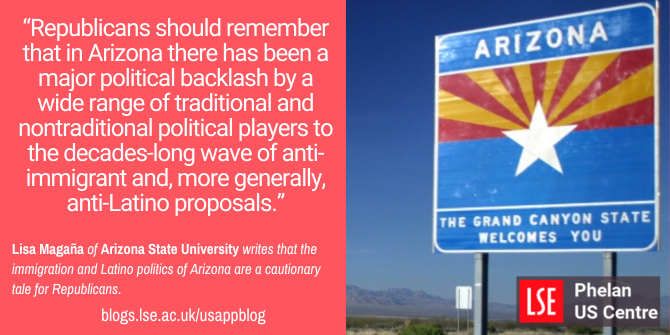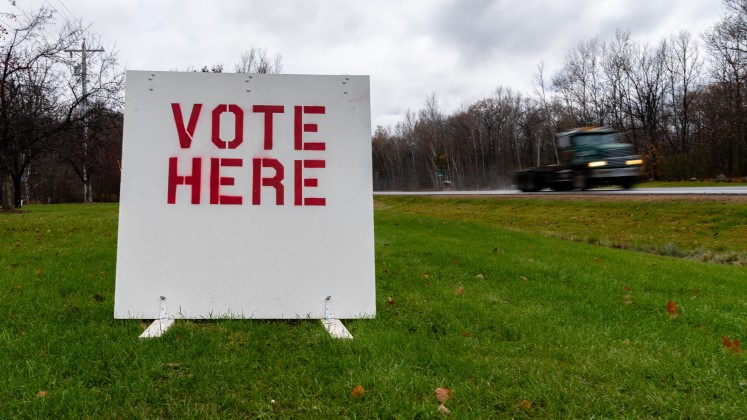 Prominent Republicans say that immigration is out of control and blame the growing number of legitimate asylee and refugee admissions, mostly from Latin America, as an indication of President Biden’s poor leadership on the issue. Republicans believe they have a winning strategy when they criticize and scapegoat Latino immigrants. Lisa Magaña writes that recent events in Arizona show that this strategy has led to a formidable political backlash in the state, and it is not a winning political strategy for Republicans.
Prominent Republicans say that immigration is out of control and blame the growing number of legitimate asylee and refugee admissions, mostly from Latin America, as an indication of President Biden’s poor leadership on the issue. Republicans believe they have a winning strategy when they criticize and scapegoat Latino immigrants. Lisa Magaña writes that recent events in Arizona show that this strategy has led to a formidable political backlash in the state, and it is not a winning political strategy for Republicans.
- This article is part of ‘The 2024 Elections’ series curated by Peter Finn (Kingston University). Ahead of the 2024 election, this series is exploring US elections at the state and national level. If you are interested in contributing to the series, contact Peter Finn (p.finn@kingston.ac.uk).
Of the over 332 million people in the United States as of 2021, 62.5 million people are of Hispanic origin making up 19 percent of the total population. The proximity to Mexico and Central America makes the United States a prime destination for Latin American immigration. As a result, if Latinos in the United States had its own country, it would be the third largest Latin American population in the world, after Mexico. Two-thirds of all Latinos in the United States are of Mexican origin, and of that, 31 percent are foreign born.
In 2020, the population of Arizona was 7,279,000, with more than half of the state’s inhabitants living in Maricopa County or the Phoenix metropolitan area (4,485,000). What happens in Maricopa County determines what happens in Arizona elections. In fact, Maricopa County is the fourth largest Hispanic county (1,380,000) in the United States, and Latinos make up 31 percent of the county’s overall population.
Ninety percent of all Latinos in Arizona are of Mexican origin and are US citizens. Despite the narrative that Arizona has a large proportion of unauthorized immigrants, this is not the case. Researchers estimate that there has been a decrease of 70,000 unauthorized individuals since 2009, when there was an economic recession.
Anti-Latino/Anti-Immigrant= It’s Personal
Despite Arizona once being part of Mexico, a number of events, legislation, and other forces have worked to limit the full political participation of Latinos in the state. Arizona has become ground zero for the nation’s debate over immigration policy and the role of American Latinos on the national political landscape. It is important to note that all immigration laws are passed at the federal level, however, Arizona has straddled the line between what is immigration-related and what is, say, business-, education- or election-related. For example, Republicans passed a law stipulating that if you are an unauthorized immigrant student and have lived in the state for decades, the student is still required to pay out-of-state tuition to attend the university. Policy makers have insisted that this policy was not created to punish unauthorized students; rather, universities have the right to require that they pay.

Image: By Wing-Chi Poon [CC BY-SA 2.5], from Wikimedia Commons
There are obvious demographic reasons to explain why anti-immigration agendas mobilize Latinos. First, Latinos are very likely to either be immigrants or to have family members or friends affected by immigration. Studies show that anti-immigrant rhetoric has politically rallied Latinos because anti-immigration policies often manifest themselves as anti-Latino. Some studies have also shown that the general experience of discrimination of Latinos has centered around immigration, whether the Latino was a US citizen or not. Latinos, regardless of their citizenship status, have experienced some type of discrimination based on racial profiling due to immigration concerns. It is important to reiterate that, in a political context, immigration is much more than a talking point; it is personal.
Misinformation and negative rhetoric about immigration
The connection between immigration and discrimination may also explain why Latinos with diverse backgrounds—such as those who are Puerto Rican, Cuban, and Columbian—have organized to oppose anti-immigrant policies. For some elected officials, inaccurate information regarding immigration is a popular tactic which can easily be promoted without being challenged. For instance, politicians and candidates may disingenuously use pejorative stereotypes when discussing immigrants to appeal to their constituent’s fears. Therefore, immigrant populations that cannot vote—noncitizens and the undocumented—are subject to further prejudice. It’s relatively easy to misrepresent or stereotype Latino immigrants, and, by extension, US-born Latinos, because of a lack of knowledge or widespread misinformation about the community.
Scholars have also theorized that some of the negative rhetoric by politicians and elected officials targeting Latino Immigrants stems from the authoritarian research model, where candidates can generate support when they frighten people into believing that they can protect them from what is terrifying or strange. In 2016, then–Republican presidential candidate Donald Trump blamed immigrants for rape, crime, terrorism, and the failing economy, and he continues to blame immigrants in his 2024 re-election campaign.
A link also exists between related immigration legislation and prevailing economic conditions. For instance, when Arizona’s economy was healthy and prosperous, politicians advocated for less restrictive measures for immigrants. There was also aggressive recruitment and outreach for guest workers, especially in the hospitality and construction industries. When the economy collapsed, those efforts went by the wayside. The economy, either robust or ailing, is one of the most notable influences on immigration legislation.
Political backlash in Arizona and beyond
Republicans believe they have a winning political strategy when they criticize and scapegoat Latino immigrants. Republicans should remember that in Arizona there has been a major political backlash by a wide range of traditional and nontraditional political players to the decades-long wave of anti-immigrant and, more generally, anti-Latino proposals. In 2020, the state flipped to Joe Biden, the first presidential win for a Democrat there since 1996. The traditional power players among Latinos include a mix of new and longstanding Latino elected officials and community leaders, while nontraditional constituencies include Latino high school students, working-class Latino voters, church members, and a diverse array of grassroots organizations.
In the 2016, 2018 and 2020 elections, we saw the impact of the New American Majority. These are groups that previously galvanized to oppose anti-immigration policies and rhetoric and have forged important new inroads into other non-traditional voters. Simply put, when Republicans push anti-immigrant legislation, target and/or scapegoat Latino immigrants, we see the political response as new political players, such as first-time voters, forge new political inroads.
Perhaps the most innovative among the political actors in Arizona are the immigrant activists. These individuals, some of whom are university students, ask their allies to vote because they themselves cannot. These brave and remarkable individuals have worked with others to, for instance, oust a state senate member, defeat a controversial sheriff, and elect candidates that believe in comprehensive immigration reform.
In the last three elections, Latino political participation in Arizona has increased. 85 percent of Latinos in Arizona identify with the Democratic Party. And Latinos are a young demographic, 1 million Latinos turn 18 every year. But, while Arizona is getting more diverse, it is also getting older. An older demographic is more favorable to Republicans.
- This article is based on the book Empowered by Lisa Magaña and César Silva
- Please read our comments policy before commenting.
- Note: This article gives the views of the authors, and not the position of USAPP – American Politics and Policy, nor the London School of Economics.
- Shortened URL for this post: https://wp.me/p3I2YF-dFn






